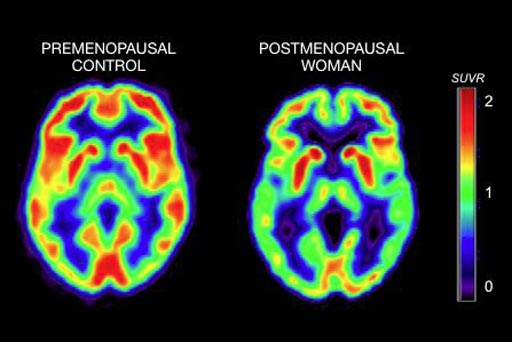Menopause Metabolic Changes May Increase Alzheimer's Risk
By MedImaging International staff writers
Posted on 23 Oct 2017
Researchers in the US have found that menopause causes metabolic changes in women’s brains that may increase the risk of them contracting Alzheimer's disease.Posted on 23 Oct 2017
Researchers have long known that although women live longer on average than men, they are still more likely to catch Alzheimer’s disease.

Image: The left-hand PET scan shows brain activity in a pre-menopausal woman, while the scan on the right shows brain activity in a post-menopausal woman (Photo courtesy of WCM).
The team from Weill Cornell Medicine (New York, NY; USA), and the University of Arizona Health Sciences (UAHS; Tucson, AZ, USA) published the results of their study in the October 10, 2017, issue of the journal PLoS One.
The researchers used Positron Emission Tomography (PET) scans to measure the uptake of glucose, an indicator of cellular activity. The study group consisted of 43 healthy women aged between 40 and 60, of which 14 were menopausal, 14 were peri-menopausal, and 15 were pre-menopausal.
The results of the study showed that peri-menopausal and menopausal women had significantly lower levels of glucose metabolism, or hypometabolism, in a number of regions in the brain, compared to pre-menopausal women.
Dr. Lisa Mosconi, associate professor at Weill Cornell Medicine, said, "This study suggests there may be a critical window of opportunity, when women are in their 40s and 50s, to detect metabolic signs of higher Alzheimer's risk and apply strategies to reduce that risk. Our findings show that the loss of estrogen in menopause doesn't just diminish fertility. It also means the loss of a key neuroprotective element in the female brain and a higher vulnerability to brain aging and Alzheimer's disease. We believe that more research is needed to test efficacy and safety of hormonal-replacement therapies at the very early stages of menopause, and to correlate hormonal changes with risk of Alzheimer's."
Related Links:
Weill Cornell Medicine
University of Arizona Health Sciences










 Guided Devices.jpg)



